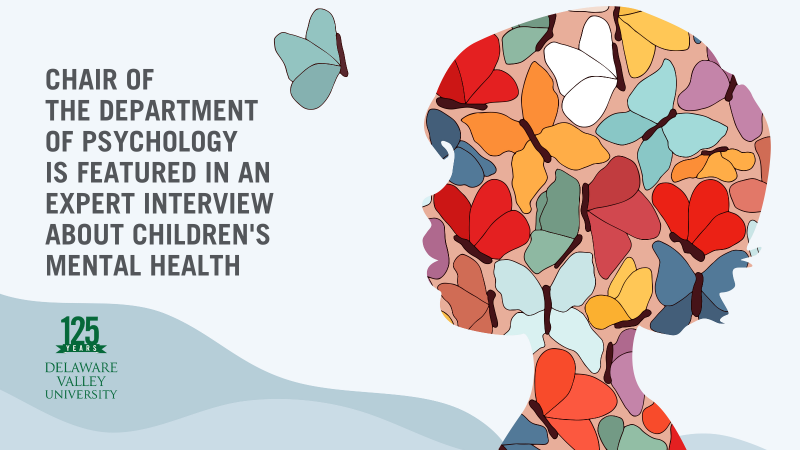Chair of the Department of Psychology is Featured in an Expert Interview About Children's Mental Health

Chair of the Department of Psychology at Delaware Valley University, Dr. Allison Buskirk-Cohen, was featured in an interview published on Online Education about children’s mental health.
In the interview, Dr. Buskirk-Cohen discusses how to begin working in children’s mental health, the top issues children and adolescents face, how COVID-19 has affected children and top resources for those working in youth mental health services.
Dr. Allison Buskirk-Cohen is an educator, scholar, and leader in higher education. Her research has focused on how interpersonal relationships influence academic success and well-being. She recently co-edited the book, Cultivating Student Success: A Multifaceted Approach to Working with Emerging Adults in Higher Education, which provides holistic practices to academically, socially, and emotionally work with emerging adults.
In her interview with Online Education about children’s mental health, Dr. Buskirk-Cohen explains that mental health issues are common among children today. “Recent estimates say that approximately one out of five to one out of every six kids and teens will experience some kind of mental health condition,” she says. “That can range from something specific to a particular situation that they’re going through, or it can be more chronic and long-lasting. But it’s a serious problem facing a lot of youth today.”
While mental health issues are common among youth, younger children tend to present with different disorders than older children and adolescents. “Things like anxiety and depression are relatively common. We tend to see increases of that in adolescence, but sometimes they do emerge in young children. In turn, a lot of younger children are diagnosed or identified with learning disorders and other behavioral problems. Those can be recognized once kids are in a formal school system,” Dr. Buskirk-Cohen explains.
The interview also discusses the impacts of COVID-19 on children’s mental health. “For some kids, the pandemic has meant mild disruption, and it’s been frustrating. For other kids, it has been incredibly traumatic where they’ve lost family and friends or their family may have seen huge financial losses. They’ve been isolated, so they might feel very fearful, angry, depressed, all of those kinds of things. There is a big variety of experiences, and certainly, for some kids, it’s had a very negative impact on their mental health,” says Dr. Buskirk-Cohen.
She continues, “For other kids, it may have offered them a break from very hectic lives, a chance to reconnect, be more creative, and be resilient. I hope that people recognize that there’s no one-size-fits-all model for how the pandemic has impacted mental health. Because of this, people need support in very different ways.”
Dr. Buskirk-Cohen also shares what it takes to begin a career in children’s mental health including education and coursework. “Whenever somebody is going through training, part of what’s expected is to take various courses that focus on developmentally appropriate therapeutic techniques for different age groups. Once someone is licensed to begin working as a mental health professional, they’re required as part of maintaining their license to earn a certain number of continuing education credits. So mental health professionals are oftentimes going to conferences, or they’re sitting through workshops, with wonderful organizations out there that specialize in these kinds of creative and fun techniques that counselors can use for working with kids.”
May is National Mental Health Awareness Month, and Dr. Buskirk-Cohen explains its significance. “Awareness events can help by changing perceptions and educating people. A lot of people don’t realize that mental health includes things like positive mental health. So how can we strengthen someone’s resiliency skills? How can we help people identify ways to make their life more meaningful and purposeful? This can be true for somebody who is six years old and someone who’s 60 years old,” says Dr. Buskirk-Cohen.
There are several ways to get involved with children’s mental health and Mental Health Awareness Month. Below are some resources to get involved:
- National Alliance on Mental Illness
- American Academy of Child and Adolescent Psychiatry
- Child Mind Institute
- National Institute of Mental Health
- CDC Mental Health Tools and Resources
To read the full interview with Dr. Buskirk-Cohen click here.